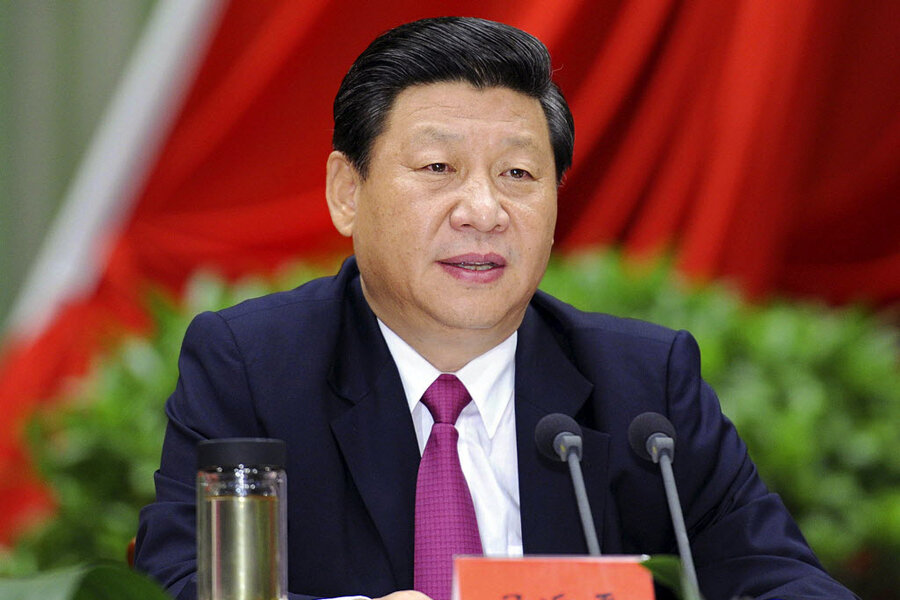Speculation abounds over Chinese president-in-waiting's low profile
Loading...
| Beijing
Where is president-in-waiting Xi Jinping?
Is he nursing a bad back after pulling a muscle in a pick-up soccer game (or maybe in the swimming pool)? Has he been convalescing after narrowly escaping a revenge killing by supporters of ousted local Communist Party boss Bo Xilai? Was he in a car accident? Or is he just really busy getting ready to lead the world's No. 2 economy ahead of an expected leadership transition next month?
Chinese micro-bloggers and overseas websites have come up with all kinds of speculation as to why the current vice president has gone unseen for more than a week. During that span, Xi canceled meetings with visiting foreign dignitaries including U.S. Secretary of State Hillary Rodham Clinton and Singapore Prime Minister Lee Hsien Loong. On Monday, it was the Danish prime minister's turn.
Xi's whereabouts during this sudden absence from the spotlight may never be known. One thing, however, is certain: China may now be a linchpin of the global economy and a force in international diplomacy, but the lives of its leaders remain an utter mystery to its 1.3 billion people, its politics an unfathomable black hole.
So when the presumptive head of that opaque leadership disappears from public view, rumor mills naturally go into a frenzy.
"There is a longstanding practice of not reporting on illnesses or troubles within the elites," said Scott Kennedy, director of Indiana University's Research Center for Chinese Politics and Business in Beijing. "The sense is that giving out such information would only fuel further speculation."
Adding grist to the mill, a scheduled photo session with visiting Danish Prime Minister Helle Thorning-Schmidt, which the media were asked to cover, was taken off the program. Thorning-Schmidt met with Vice Premier Wang Qishan on Monday and was scheduled to meet Premier Wen Jiabao on Tuesday.
The Foreign Ministry claimed the Xi-Thorning-Schmidt meeting was never intended to take place.
"As I said last week, China's state councilors will meet the Danish prime minister," Foreign Ministry spokesman Hong Lei said. When asked about the rumors of an injury, Hong said "we have told everybody everything," and refused to elaborate.
Most online speculation about the portly 59-year-old Xi has centered on a back problem, possibly incurred when he took a dip last week in the swimming pool inside the Zhongnanhai leadership compound. Another rumor has the back being hurt in a soccer game. It wasn't clear what the sources of the information were.
More dramatically, the U.S.-based website Boxun.com cited an unidentified source inside Zhongnanhai as saying Xi was injured in a staged traffic accident that was part of a revenge plot by Bo's supporters in the security forces. Another member of the all-powerful Politburo Standing Committee, He Guoqiang, was also injured in a similar incident, said the site, which acts as a clearinghouse for rumors and unsubstantiated reports. It has correctly predicted some recent political developments and been wildly off the mark on others.
As if to demonstrate the range and randomness of the speculation, Boxun later replaced the report with another saying Xi was merely preoccupied with preparations to take over as head of the ruling party.
This year, China has seen an unusual amount of political intrigue, with the spectacular downfall of Politburo member Bo exposing divisions within the leadership and prompting rumors of nefarious activity ranging from the wiretapping of top leaders to an attempted coup.
The sudden transfer of a key secretary to President Hu Jintao earlier this month also spawned conjecture about a Ferrari crash involving the aide's son and an ensuing attempted cover-up.
Rumors about Xi were churned further by Russian President Vladimir Putin's cryptic remark over the weekend that the start of the Asia Pacific Economic Cooperation forum leaders' meeting in Vladivostok had been delayed because Hu needed to attend to an important but unspecified domestic issue.
The tension and uncertainty are heightened by the timing ahead of a generational shift to a new leadership that is to be headed by Xi. Still, in keeping with the China government's proclivity for secrecy, the logistics of the transition remain unknown.
Xi is expected to first assume Hu's mantle as Communist leader at a party congress held once every five years. Yet the dates for the meeting, expected in the second half of October, have yet to be announced, prompting talk that at least some of the seats on the nine-member Standing Committee remain up for grabs.
Recent economic and diplomatic challenges have added to the sense of insecurity.
While China avoided the worst of the global economic slowdown, export growth and domestic demand have both fallen sharply in recent months, prompting forecasters to slash their estimates for economic growth needed to create jobs and fill government coffers.
Meanwhile, Beijing has been deeply unnerved by Washington's new emphasis on military and political ties to China's neighbors in the western Pacific and finds itself enmeshed again in a nagging dispute with Japan over uninhabited islands in the East China Sea.
Wang Xiangwei, editor-in-chief of Hong Kong's South China Morning Post and a longtime state media insider, wrote Monday in his newspaper that Chinese leaders' meetings are planned well in advance and cancellations are extremely rare.
"Barring Xi himself offering a very unlikely explanation today about his canceled meetings last week, the outside world may never know the exact reason, and the rumors are unlikely to fade away," Wang wrote.
Though absent in person, Xi did pop up Monday on the front page of the party academy's official newspaper Study Times alongside a transcript of the speech he delivered nine days earlier.
In the text, he enjoins newly enrolled cadres to use their time on the leafy campus in the northern Beijing suburbs to think critically about major national issues and not spend it "expanding personal contacts and inviting guests to dinner."







